Scientists discover method to reactivate immune system against bowel cancer

Irish researchers have identified how bowel cancer disables the body's immune defenses and developed a method to reactivate them. The breakthrough could improve treatment outcomes for colorectal cancer, which remains the world's second leading cause of cancer deaths.
Researchers at the University of Galway in Ireland have made a significant breakthrough in understanding how bowel cancer evades the body's natural defenses, discovering a method to reactivate the immune system against the disease. The study addresses why immunotherapy—which has revolutionized treatment for cancers like melanoma and lung cancer—has shown limited effectiveness against colorectal cancer, opening new possibilities for treatment enhancement.
Mechanism of Immune System Suppression
The research team first identified how colorectal cancer effectively "switches off" the body's immune response against tumor cells. They discovered that structural cells supporting tumor growth can hijack the immune system's cancer-fighting mechanisms, essentially applying brakes to the body's natural defense systems. This sophisticated evasion strategy explains why immunotherapy approaches have previously demonstrated limited success against this particular cancer type.
Enzyme Identification and Therapeutic Approach
After pinpointing the specific biological mechanism, scientists identified a key enzyme responsible for disabling the immune system's anti-tumor capabilities. The researchers then utilized drugs called sialidases to counteract this process, successfully reactivating the tumor-fighting cells in laboratory settings. This intervention resulted in measurable reductions in tumor size and helped prevent further cancer spread in experimental models.
Global Significance and Rising Incidence
The discovery holds particular importance given bowel cancer's status as the world's second leading cause of cancer-related mortality. In Ireland alone, the disease affects more than 2,500 individuals annually, while global health data reveals a concerning trend of rising early-onset diagnoses, with cases among younger people nearly doubling since 1990. This research could potentially address treatment challenges for this growing patient population.
Advertisement







Comments you share on our site are a valuable resource for other users. Please be respectful of different opinions and other users. Avoid using rude, aggressive, derogatory, or discriminatory language.